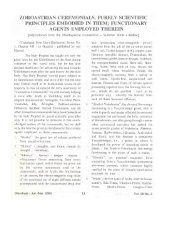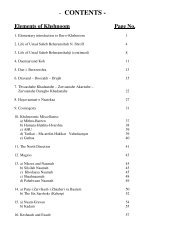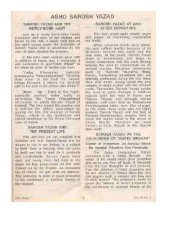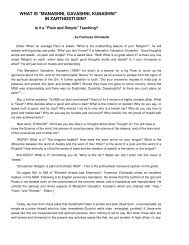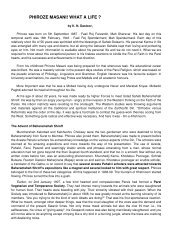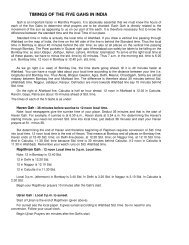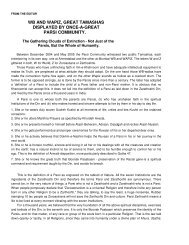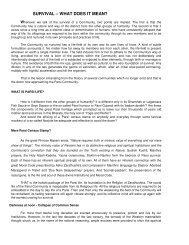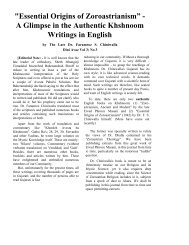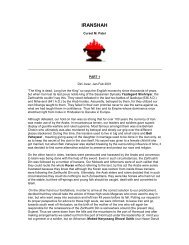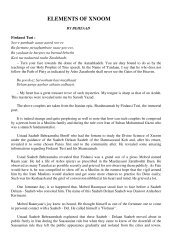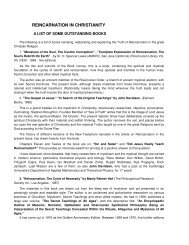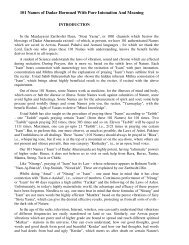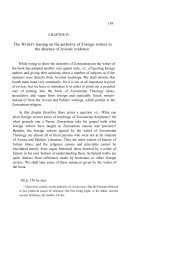the authentic key of ilm-e-khshnoom can alone open the door
the authentic key of ilm-e-khshnoom can alone open the door
the authentic key of ilm-e-khshnoom can alone open the door
Create successful ePaper yourself
Turn your PDF publications into a flip-book with our unique Google optimized e-Paper software.
THE SCIENCE OF STAOTA YASNA - THE VIBRATIONS<br />
IN NATURE, AND IN MANTHRA - PRAYERS.<br />
The Ancient Wisdom on Different Modes <strong>of</strong> Writing - Kalam-Kashi.<br />
by Dr. Saheb Framroze Chiniwalla<br />
[In <strong>the</strong> last two issues, <strong>the</strong> author pointed out that Avesta <strong>of</strong> our Holy Scriptures has several levels <strong>of</strong><br />
meanings and messages. To decipher <strong>the</strong>m requires <strong>the</strong> spiritual Knowledge <strong>of</strong> "Staota Yasna", <strong>the</strong> mystical<br />
Science <strong>of</strong> Vibrations. Every particle, may it be physical, ultra-physical or divine, in Ahura's Creation operates<br />
as a Vibration. In <strong>the</strong> Manthra or Mantra <strong>of</strong> <strong>the</strong> Holy Scriptures, <strong>the</strong>se vibrations are embodied in human<br />
speech i.e. transmuted in <strong>the</strong> words, which <strong>can</strong> be pronounced by <strong>the</strong> human tongue. The pronouncing i.e.<br />
<strong>the</strong> recitation <strong>of</strong> 'Manthra's induces divine vibrations within <strong>the</strong> personality <strong>of</strong> one who chants <strong>the</strong>m, and<br />
attunes him or her to <strong>the</strong> original Nature's Vibrations. That is <strong>the</strong> primary object <strong>of</strong> Manthra Prayers. At <strong>the</strong><br />
same time, <strong>the</strong>y have meanings, which <strong>can</strong> be comprehended only through <strong>the</strong> Science <strong>of</strong> Staota Yasna, a<br />
Science known to <strong>the</strong> Saints, Sages and 'Paigamber's.<br />
'Manthra's, <strong>the</strong>refore, are not just ordinary literary writings like poetry or drama or novel or essay.<br />
Unfortunately this pr<strong>of</strong>ound truth is completely ignored in <strong>the</strong> present day West oriented studies. The reason<br />
is, (as Dr. I. J. S. Taraporewala has very ably pointed out) that early religions <strong>of</strong> Iran and India are considered<br />
by <strong>the</strong>se studies as mere "babblings <strong>of</strong> infant humanity". The truth is exactly opposite. The Saints and<br />
Prophets and Rishis were much more aware <strong>of</strong> <strong>the</strong> sacred, secret and Spiritual Truths than <strong>the</strong> modern<br />
Scientists and Savants; <strong>the</strong> latter are "mere infants". (Page 6, "The Divine Songs <strong>of</strong> Zarathushtra"). Just a<br />
five-centuries old materialistic "scientific thinking" <strong>can</strong>not brush aside thousands <strong>of</strong> years old spiritual wisdom.<br />
One <strong>of</strong> <strong>the</strong> branches <strong>of</strong> <strong>the</strong> ancient wisdom is <strong>the</strong> composition and structuring <strong>of</strong> <strong>the</strong> 'Manthra's, and<br />
deciphering <strong>of</strong> <strong>the</strong>ir meanings and messages.<br />
In what follows, Dr. Saheb Framroze gives some idea <strong>of</strong> <strong>the</strong> ancient Science and Art <strong>of</strong> writing, with<br />
special reference to Avesta Manthra. This is <strong>the</strong> continuation <strong>of</strong> his treatment <strong>of</strong> <strong>the</strong> subject in his Nikeez -<br />
Vol. I (in Gujerati) p.35 et seq. (The following starts from p.37).]<br />
Please know that writing in <strong>the</strong> ordinary language, which is called "Naksha", is <strong>of</strong> numerous kinds. The<br />
mode <strong>of</strong> <strong>the</strong> present day writings, which is known as <strong>the</strong> literary mode, and through which <strong>the</strong> literatures <strong>of</strong><br />
various nations are written is <strong>of</strong> one kind, known as "Taavil-ni-Kalamkashi".<br />
[KND's Note: 'Taavil’ means elaboration, explanation, elucidation. "Kalam-Kashi" means to express by<br />
writing. All <strong>the</strong> present day literary writings are simple, straight and easily comprehensible, and <strong>the</strong>refore<br />
constitute 'Taavil ni Kalam Kashi'. The writer conveys his ideas and feelings in words which are not difficult to<br />
follow and absorb. If you come across a word you do not know, you <strong>can</strong> find out its meaning from a dictionary<br />
and understand what <strong>the</strong> writer desires to convey in <strong>the</strong> sentence.]<br />
This "taavil-ni-Kalamkashi" is one <strong>of</strong> <strong>the</strong> kinds <strong>of</strong> what is known as "Mithra-ni-Kalam-Kashi". (Mithra, here,<br />
means thought.) Mithra-ni-Kalamkashi is that where you <strong>can</strong> see a line <strong>of</strong> reasoning, apparently. But <strong>the</strong>re<br />
are, in Avesta, Manthra-ni-Kalamkashi and Yasna-ni-Kalam-Kashi, which are not found in <strong>the</strong> present-day<br />
writings; <strong>the</strong>ir structuring (mode <strong>of</strong> writing) has gone into oblivion. (Manthra, here, means <strong>the</strong> word with a<br />
hidden meaning; and Yasna, here, means a still deeper secret meaning.) In <strong>the</strong>se two Kalam-Kashi (modes <strong>of</strong><br />
writing) no straightforward meaning is seen; <strong>the</strong> meaning (or elaboration) is required to be searched out.<br />
[KND's Note: This means <strong>the</strong>re are three modes <strong>of</strong> writing: Mithra, Manthra, Yasna. Mithra is simple<br />
enough to follow; Manthra and Yasna modes are not. The latter two are to be uncovered through special<br />
Rules founded on <strong>the</strong> Science <strong>of</strong> Staota - Yasna. Please note that <strong>the</strong> three words, Mithra, Manthra and<br />
Yasna, in this context, have different meanings as given above, than elsewhere in o<strong>the</strong>r context.]



